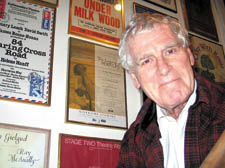|
|
 |
| |

James Roose-Evans |
How to still the chattering monkeys
James Roose-Evans, founder
of Hampstead Theatre, talks to Ruth Gorb about his new book which was inspired by the monthly meditation sessions he runs in Belsize Park
Finding Silence. By James Roose-Evans.
The History Press £8.99
ONCE a month, in a quiet room overlooking the rooftops of Belsize Park, a dozen or so people meet. They are there to meditate – to try to meditate, most of them will say – and through meditation to find silence, and ultimately some sort of peace.
The man who leads them (although he balks at the word “leader”) is James Roose-Evans. He was asked to start the group, and says “like so much in my life, it simply happened and I have gone with it”.
He is, of course, the founder of Hampstead Theatre, and is so many other things too – writer, actor, director, teacher, the quintessential Man of the Theatre.
What is less well-known is that he is an ordained Anglican priest. There is sometimes surprise, disbelief that the very worldly and the very spiritual can co-exist in one man: for all its apparent glamour the theatre is, after all, a tough world, full of rivalry and disappointment.
Mark Tully, the distinguished journalist who has written the foreword to James Roose Evans’s new book, Finding Silence, explains the dichotomy in Roose-Evans’s life: he has found a way, Tully writes, to still the “chattering monkeys” in the busy mind and has found a centre which is his refuge. He has done it through meditation.
Roose-Evans is a splendid advertisement for the spiritual life: charismatic, humorous, as energetic in his 80s as he ever was, with something of the old actor/manager about his style – “lovely to see you, dear heart”.
Much-loved for his warmth and goodness, there is nothing pious about him (his jokes can be salty, his language fruity) nor is there an air of piety about the members of his group.
They are all mature, thoughtful, professional people, most of them agnostics. There are several psychotherapists, a retired GP, a theatre agent, an artist, a publisher, a teacher of the Alexander Technique, and two counsellors. Some of them come from across London to join the group; all of them are there seeking something – but what?
A retired clinical psychologist says simply she came because she had suffered the loss of the two people closest to her. “I heard about workshops James was running on grief and loss, then that he had a meditation group in Belsize Park.
“My first response was that I couldn’t do it: ‘Nonsense,’ said James.”
She still finds it hard to meditate; her mind wanders off, despite the encouraging atmosphere Roose-Evans creates. Sit upright, he says, don’t slump. Close your eyes. Contemplate, use a mantra, breathe… He reads a piece or a poem, and it is these he has gathered together in his book.
He writes about what most people would consider difficult things in a totally accessible way. He quotes Emily Dickinson, Joyce Grenfell, Maggie Smith. There is much about the arts, about nature and gardening, which is his passion – he likes to boast that after a serious illness recently, he spent two hours pulling out ground elder.
He writes about studying for holy orders, and the house overlooking the sea in Ireland he once had where there was such a powerful presence that he had a sense of being in a new phase in his life. Yes, he writes about religion (he describes himself as a Jungian Christian), but he embraces all religions, all of human spiritual experience.
One member of the group says James has such a rich inner and outer life. She is an artist, and it was she who started the group, but confesses there are times when she finds meditation hard.
“There are periods when I can, and when I can’t,” she admits. “But trying is part of it. You have to allow it to happen. And there has been the occasional ecstasy. I never expected it.”
She describes it in more practical terms as emptying your mind of everyday preoccupations, of seeing things from a different perspective, of making a space for love, hope, charity and creativity.
Another member, a doctor, says that most theologians are too remote from our lives; what meditation offers is a simple, natural practice. It is, he says, an oasis of silence.
Silence is a word Roose-Evans uses again and again, recognising that it is something increasingly hard to find. We all have to struggle to find it, he says.
A long term friend from the theatre world talks about the difficulty of meditating and says “It is like taking a little child by the hand and taking it back into silence.”
There are many ways of meditating, she says, adding: “I think we meditate when we listen to music, when we see something beautiful.”
All the members of the group say they feel calmer after meditation: less agitated, says one, more at peace says another, yet another that “a lot of it is James, his kindness and spiritual quality – you feel bathed in warmth.”
That quality comes through every page of his remarkable book, which is a collection of 52 short pieces, one for every week of the year.
In his foreword Mark Tully says that these meditations bring home to him an awareness of our oneness with nature and hence our oneness with the universe.
He ends with James’s own words: “One has only to sit in a garden in spring, in the early hours…as the birds flit and whirr about their tasks, never colliding…We too are birds of passage, and yet we are part of the whole…”
|
 |
|
|
 |
 |
|
 |
|


